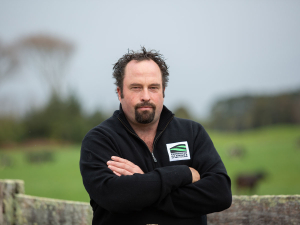Editorial: RMA reforms uproar
OPINION: The euphoria over the Government’s two new bills to replace the broken Resource Management Act is over.
 Richard McIntyre says that 42.3% of respondents to the Federated Farmers Banking Survey said they felt their mental health and wellbeing were impacted by banking issues.
Richard McIntyre says that 42.3% of respondents to the Federated Farmers Banking Survey said they felt their mental health and wellbeing were impacted by banking issues.
Farmers' relationships with their banks are “absolutely” having an impact on their mental health.
That’s according to Federated Farmers domestic commerce and competition spokesperson Richard McIntyre.
McIntyre says that 42.3% of respondents to the Federated Farmers Banking Survey said they felt their mental health and wellbeing were impacted by banking issues.
“That’s nearly half of farmers feeling as if their mental health is suffering as a result of their relationships with banks,” he told Rural News.
“The struggle is real, and this is a huge issue for farmers.”
He says a significant issue is that farmers do not receive enough support from their banks.
According to the banking survey, one in five farmers felt their banks were doing enough to support them during periods of high interest rates.
“In addition, the number of farmers feeling undue pressure from their banks has gone from one in 20 farmers in 2015, to one in four farmers today,” McIntyre adds.
“The pressure farmers are facing from their banks is real and is rapidly becoming the number one issue facing farmers today.”
He says that farmers have accepted that margins on their loans are “a bit higher” than home loans, as there is more risk associated with running a business.
“However, we think this margin is higher than it used to be, and higher than it needs to be,” McIntyre says. “The difference seems to be getting larger.
“The core issue is that banks seem to be pricing for risk, but not actually taking it,” he explains.
“In many cases we’ve seen millions of dollars in equity that should cover the risk of the loan completely, but banks still charging high interest rates.”
McIntyre’s comments come after a Primary Production Select Committee hearing late last month which saw committee members ask for their perspective on the issue of rural bank lending.
ANZ managing director business and agri Lorraine Mapu told the committee that there has been “a lot of discussion” surrounding the cost of borrowing for farmers.
“Interest rates for agri customers are influenced by economic conditions, regulatory settings, and monetary policy,” Mapu says.
She says the higher interest rates farmers have experienced in the past two years are largely due to a combination of the Official Cash Rate (OCR), wholesale rates, and funding costs.
“So, the increase in the amount of capital banks must hold against the lending also has an impact. Risks around the sector impact the amount of capital banks must hold against the lending and therefore the interest they charge.”
Mapu says these risks include volatility in the export market, farmgate prices and inflation.
She says ANZ remains “committed” to supporting farmers.
The Meat Industry Association of New Zealand (MIA) today announced that Chief Executive Officer Sirma Karapeeva has resigned from the role.
The winners of the 2026 Hawke’s Bay/Wairarapa Dairy Industry Awards were announced at the annual awards dinner held at Copthorne Solway Park in Masterton on Thursday evening.
Environment Southland is welcoming this week’s decision by the Environmental Protection Authority (EPA) to approve the release of Blaptea elguetai, a leaf‑feeding beetle that will help control the highly invasive Chilean flame creeper.
This March, the potato industry is proudly celebrating International Women’s Day on 8 March alongside the International Year of the Woman Farmer, recognising the vital role women play across every part of the sector — from paddocks and packhouses to research, leadership, and innovation.
Fruit trader Seeka posted a record profit and returns to shareholders in 2025.
Recent weather events in the Bay of Plenty, Gisborne/Tairawhiti, and Canterbury have been declared a medium-scale adverse event.
OPINION: Staying with politics, with less than nine months to go before the general elections, there’s confusion in the Labour…
OPINION: Winston Peters' tirade against the free trade deal stitched with India may not be all political posturing by the…